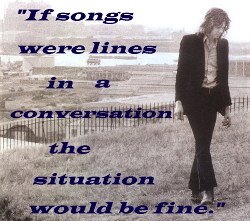
The "Obscenity/Profanity/Vulgarity" post of March 2009 was so icey, I had to post a follow-up. If you guys read through this dorky post about science, I'll give you a present at the end!
In Real Life I have been told that I am rather schoolteacher-esque (it's ok, I'm owning it) and rarely say all those words that George Carlin and Too $hort had a ball with. I have this weird hang-up about being ladylike. So when you see me in line at Amoeba, lookin all flushed because I finally found "Maggot Brain" on vinyl, please believe that it really is me even though you won't hear me say the f word like I do so frequently on here. We ladies are complex sometimes, fellas.
Every comedian/sex kitten's favorite magazine Scientific American says that cussin's good for you and helps relieve pain; in studying how long people could keep their hands under icy-cold water, those who said cuss words reported less pain and could keep their hands immersed for much longer than those who said a non-obscenity. It's all primal, right-brain/left-brain evolution stuff because we're animals, people. Animals, I tell you.
"Although cursing is notoriously decried in the public debate, researchers are now beginning to question the idea that the phenomenon is all bad. 'Swearing is such a common response to pain that there has to be an underlying reason why we do it,' says psychologist Richard Stephens (who) led the study. And indeed, the findings point to one possible benefit: 'I would advise people, if they hurt themselves, to swear,' he adds.
How swearing achieves its physical effects is unclear, but the researchers speculate that brain circuitry linked to emotion is involved. Earlier studies have shown that unlike normal language, which relies on the outer few millimeters in the left hemisphere of the brain, expletives hinge on evolutionarily ancient structures buried deep inside the right half.
One such structure is the amygdala, an almond-shaped group of neurons that can trigger a fight-or-flight response in which our heart rate climbs and we become less sensitive to pain. Indeed, the students' heart rates rose when they swore, a fact the researchers say suggests that the amygdala was activated.
That explanation is backed by other experts in the field. Psychologist Steven Pinker of Harvard University...compared the situation with what happens in the brain of a cat that somebody accidentally sits on. 'I suspect that swearing taps into a defensive reflex in which an animal that is suddenly injured or confined erupts in a furious struggle, accompanied by an angry vocalization, to startle and intimidate an attacker,' he says.
But cursing is more than just aggression, explains psychologist Timothy Jay, who has studied our use of profanities for the past 35 years. 'It allows us to vent or express anger, joy, surprise, happiness,' he remarks. 'It's like the horn on your car, you can do a lot of things with that, it's built into you.'"
PS -
In related news, you are now about to witness the strength of street knowledge 'cause I found
Straight Outta Compton, edited down to just the motherfucks and bitches! (Sorry, Mom)
FINALLY.
(via SoundOff)
Download.
&!$%@*:
mp3.









No comments:
Post a Comment